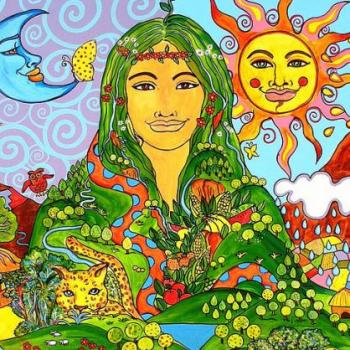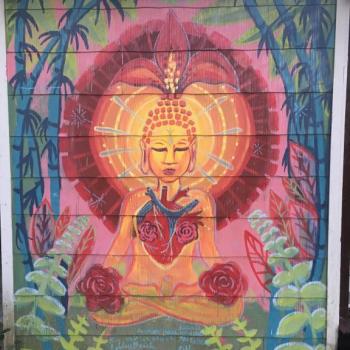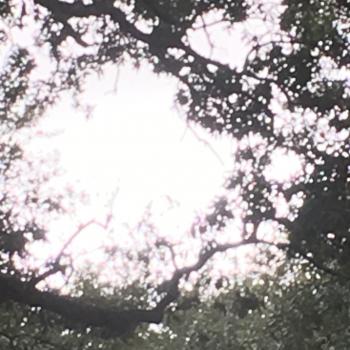Isaiah 61 was the Daily Office Old Testament reading for today. Some of you will recall that Jesus read this text as part of his first sermon in Nazareth in Luke 4. The first two verses read: “The spirit of the Lord God is upon me, because the Lord has anointed me; he has sent me to bring good news to the oppressed, to bind up the brokenhearted, to proclaim liberty to the captives, and release to the prisoners; to proclaim the year of the Lord’s favor, and the day of vengeance of our God; to comfort all who mourn.” What in the world is a “day of vengeance” doing in the same line as the “year of the Lord’s favor”? Jesus stopped his sermon before the vengeance part. But it’s still there in Isaiah 61. What does God’s favor have to do with His vengeance? Everything, if you’re one of the oppressed and God’s favor means victory over your oppressors.
I. Insights from Frantz Fanon
Frantz Fanon’s The Wretched of the Earth is the seminal text of what’s called post-colonial studies. He wrote it trying to explain why the Algerians were “uncivilized” in their approach to overthrowing the French during their war for independence rather than allowing the French to engage in a paternalistic transfer of power as their decolonization process. I wanted to share a few passages from Fanon’s text in order to give a backdrop that may shed some light on Isaiah 61, namely why “the day of God’s vengeance” is “good news to the oppressed.”
The settlers’ town is a strongly built town, all made of stone and steel. It is a brightly light town… The settler’s town is a well-fed town, an easygoing town; its belly is always full of good things… The native town is a hungry town, starved of bread, of meat, of shoes, of coal, of light. The native town is a crouching village, a town on its knees, a town wallowing in the mire. 38-39
Here Fanon is talking about the two sides of the colonial order, the settler’s town and the native town, which are basically analogous to the suburbia and inner city of 21st century America. The hunger and poverty of the native town are violent, even if no laws have been broken in causing them. They kill people in and of themselves and they cause people who suffer under them to act desperately and lash out with violence on others. What Fanon points out is that the default state of the colonial order is already violent, even though it isn’t so for the settlers who live in privilege, so when the natives lash out with violence against the settlers, they are not bringing violence into an otherwise peaceful arrangement.
The natives’ challenge to the colonial world is not a rational confrontation of points of view… It is not enough for the settler to delimit physically… the place of the native… The settler paints the native as a sort of quintessence of evil. Native society is not simply described as a society lacking in values… The native is declared insensible to ethics; he represents not only the absence of values… He is… the enemy of values, and in this sense he is the absolute evil. 41
The plight of the natives and the exploitation of their labor and natural resources must be justified by the colonist, usually through the moral condemnation of native culture. This is often accomplished, particularly in the African context, through judging sexual practices in native culture that differ from the chaste monogamy of the bourgeois settlers. The same moral justification strategy was deployed in the American slave plantation context, which turned into the view under segregation that every black male was a potential rapist of white females (c.f. Emmett Till). After the fall of segregation, what evolved to replace its boundaries are the sexual boundaries of suburbia/private school/home-school vs. inner city/public school that serve the self-justification purposes of suburban white evangelicals today. The Christian worldview has unfortunately lent itself quite often to this perspective that we might call “the total depravity of the other,” which has worked very well as a strategy for morally justifying oppression.
The native is always on the alert, for since he can only make out with difficulty the many symbols of the colonial world, he is never sure whether or not he has crossed the frontier. Confronted with a world ruled by the settler, the native is always presumed guilty. 53
The natives lived in a reality in which they were guilty by default, kind of like “driving while black” in our . Even if they engaged in all the appropriate gestures of obeisance and self-deprecation, they could still be subject to unpredictable violence on the part of the colonial authorities for being in the wrong place at the wrong time. This default state of damnation is the ontology of native existence in the colonial order. This kind of spiritually deformed existence precludes the possibility of authentic communion between native and settler under God.
To break up the colonial world does not mean that after the frontiers have been abolished lines of communication will be set up between the two zones. The destruction of the colonial world is no more and no less than the abolition of one zone, its burial in the depths of the earth or its expulsion from the country. 40-41
Since the colonists’ identity is based upon the dehumanization of natives, “peaceful” decolonization is not possible if that means that the colonists get to remain colonists and the natives remain natives. The only way to remove unjust violence from native existence is for the colonists’ existence to be eradicated, whether this happens because the colonists flee, get killed, or undergo such a radical transformation of identity that they cease to be colonists as such (this third option being the Christian option that Fanon doesn’t consider).
II. Isaiah 61 as a text about decolonization
Isaiah 61 speaks about the messiah’s deliverance of his people: the oppressed, the brokenhearted, the captives, and the prisoners. The state from which they are being delivered is not an abstract “spiritual” malaise, but a very real social context in which they languish under an oppressor, whether it’s Babylon, Persia, Macedonia, Rome, or somebody else. Isaiah’s people are analogous to the natives described by Fanon who have been spiritually deformed by the experience of colonial occupation.
Without a complete break in the established social reality, the power differential between colonist and native would persist even in the absence of overt physical violence (the power differential itself being a sublimated spiritual violence). If God allowed for heaven to be a continuation of this social reality, then authentic communion between God and the natives and colonists would not be possible, due to the natives’ self-perceived illegitimacy and the colonists’ privileged oblivion and sense of entitlement.
This is why part of the liberation of the oppressed must involve the day of God’s vengeance against their oppressors. The kingdom of God cannot be a new social order unless the mighty are forcibly dethroned whether this happens voluntarily through their repentance or through the upheaval of God’s wrath. Interestingly, Fanon describes decolonization as an atheistic form of eschatology: “Decolonization is the veritable creation of new men. But its creation owes nothing of its legitimacy to any supernatural power” (36).
Fanon confirms the necessity of God’s wrathful overthrow of the powers and principalities of the world in order for the oppressed to gain a dignified humanity. But in the Christian account of eschatology, God’s reservation of vengeance for Himself (Romans 12:19) is the reason why the oppressed can remain nonviolent and avoid the corruption of becoming oppressors. Of course, one of the ways in which the powers and principalities are overthrown is for God to absorb all the sublimated violence of the social order through Christ on the cross so that the oppressed can experience God’s solidarity with them and the privileged can renounce their privilege and join in this solidarity.
But this only liberates those who accept their loss of status in the old social order and put themselves under the mercy of God. To seek eternal communion with God and humanity on your own terms as an oppressor or a victim of oppression is to carry the sublimated violence of the old world into the new. In Jesus’ kingdom, there are no colonists, only natives. Or to put a different frame on it, there are no legitimate citizens, only illegal aliens who have been granted amnesty by the blood of Christ.
We can join the natives and illegal aliens only by renouncing the entitlement of our earthly status and putting ourselves under the mercy of God. This means a lot more than simply saying a “sinner’s prayer” to get “in,” which then serves to reinforce and justify the sense of entitlement you already had (a common phenomenon in the suburban evangelical church). Part of God’s justice to the people who suffer violence under the earthly social order is to disallow the privileged to enter His kingdom on their terms. To attempt such presumptuousness is to put yourself on the wrong side of God’s day of vengeance, sinner’s prayer or not.











